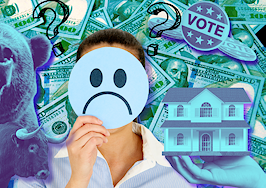Calling each other or anyone a racist isn’t going to end racism. When we use the “r” word, people tune out. Fear of being called a racist can cause people to stay away from any opportunity to talk about racism or to learn more about how it affects our lives.
We all act in ways that are racist. We live in a society where racism is baked into our institutions, yet I’ve never heard anyone call themself a racist. We need to move forward and end racism. Calling people racists isn’t helping, and it takes our attention away from changing our institutions.
People of color were prevented from owning low-priced new construction in new developments generations ago. Lending guidelines and deed restrictions kept them out. Those policies hurt families for generations because they were unable to build wealth through homeownership the way my white parents did.
Segregation exists today because of the housing policies of previous generations. We have maintained that segregation intentionally and unintentionally.
Waiting for those who are being excluded from homeownership to fix the problem or to reach out isn’t going to solve the problem, not today, not ever. We need to recreate homeownership and change it so that anyone who can currently pay rent each month can qualify for a mortgage with a similar payment.
A couple of years ago, on the 50th anniversary of the passage of the civil rights and fair housing laws, we learned that we haven’t made much progress. There is a homeownership gap, and it has been getting wider at 30 percent, not narrower. There are also widening gaps in income, health care and education that put some future homeowners at risk.
To fix these problems, as real estate agents, we can begin to make a difference by challenging our own institutions and some of our rules. Let’s consider how.
When we surround ourselves with “like-minded” people, we are being exclusive, which is just the opposite of inclusive. Let’s consider changing the rules in organizations where recommendations from other members are needed for leaders or committee members, but exceptions are made when someone complains.
We can end institutional racism in our own institutions. We need to work together to dismantle them, take the exclusion out and put them back together again in a way that will serve us and our clients in a post-racist society.
In a system that’s racist, there are rules and policies that lead to exclusion and discrimination. That is what systemic racism is. It’s so ingrained in the systems that we don’t notice it. We need to see it and fix it. We need to be overly sensitive in how we treat consumers and each other.
As a Realtor, I’m a part of the system that’s made up of laws and rules and business practices. I am reminded over and over that I have to watch what I say, or I can be accused of a fair housing violation. There aren’t any classes on how to promote fair housing.
Let’s start with our own businesses and the rules and regulations put in place by our MLS, our associations and our companies, too. They all represent systems that might need to change.
We can identify policies and rules that can lead to discrimination and speak up or fight to get them changed. We can start with MLS rules and national policies that allow for “office exclusive” listings. Office exclusive listings are not allowed in my company — do you allow them in yours?
In Minnesota, there is at least one MLS rule that appears to violate fair housing rules and goes against state safety guidelines put in place by the governor during the pandemic. At the very least, it’s a rule that we don’t need to have to market and sell houses.
How many unnecessary rules do we have in real estate? How many are harmful to some but not to others? I can’t change an MLS rule, but I can break it. If I get caught, I’ll make a lot of noise as I fight the fine.
Why isn’t there a system or process in our Realtor institutions for pointing out unfair practices or potential fair housing violations? Why does the process for changing an unfair or illegal rule take months of meetings and bureaucratic “make work”?
Why isn’t there more about fair housing in the Realtor “Commitment to Excellence” program? There is a section on “Article 10” and “Fair Housing as a Marketing Tool” and “You can do more. Provide enthusiastic, objective information on specific amenities to reach a diverse set of home seekers.”
Realtors were once expected to enforce redlining and deed restrictions. It was even in the Code of Ethics. As a group, we have a great deal of control over how houses are bought and sold. NAR has a lot of power and control over housing. It can be used for good or for evil.
All of our rules and the Realtor Code of Ethics should be carefully re-examined to determine if the rules promote anti-racism and fair housing. We need to look at old rules through the lens of fair housing and get rid of unnecessary ones because every rule has consequences, both intended and unintended.
We have rules on top of our rules, traditions and business practices, and probably some secret handshakes that I don’t know about. So many rules are needed so that we can make money without stepping all over our peers in their quest to make money. It doesn’t seem possible to have so many rules and have fair housing, too.
While many Realtors are having the best year ever, some of us have a little extra time because we’re staying home more than we used to.
We can spend that time educating ourselves and researching housing disparities and gaps in our own communities. We can look for patterns and come up with ideas on how to close the homeownership gap and work toward being a part of the solution, instead of being a part of the problem.
We can work in groups or with our boards of Realtors to support local candidates and local ordinances that will help end systemic racism. Instead of always supporting the candidates who will help us make or keep more of our money, we could endorse and support candidates who help us close the homeownership gap.
Being a real estate agent or company is all about making money. Closing the homeownership gap by increasing the number of homeowners is a great way to make more money.
Let’s find the discrimination and exclusive institutions in our own industry and start dismantling them one at a time and rebuild them to be inclusive and anti-racist. If not now — when?
Teresa Boardman is a Realtor and broker/owner of Boardman Realty in St. Paul. She is also the founder of StPaulRealEstateBlog.com.













